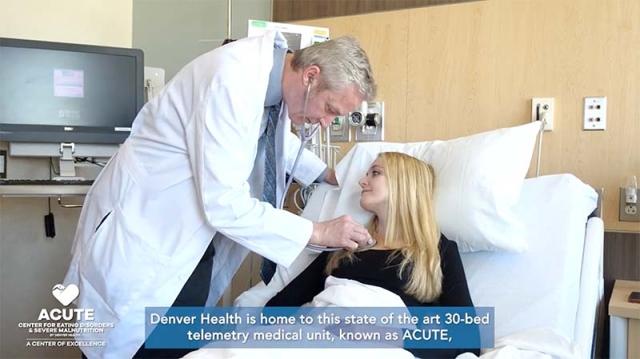
When Life-Saving Medical Care is Needed, Experience Matters
Severe eating disorders are often accompanied by dangerous, life-threatening medical complications. Significant medical instability results from progressive malnutrition, purging behaviors and blood chemistry abnormalities, and compromises virtually all of the body’s vital organs and systems.
ACUTE’s private, hospital-based medical telemetry unit at Denver Health Medical Center in Denver, Colorado only treats these complex medical issues in patients with extreme forms of eating disorders and severe malnutrition.
Take a Virtual Tour of ACUTE

Understanding common medical complications or anorexia nervosa (AN), bulimia nervosa (BN) and avoidant restrictive food intake disorder (ARFID) is crucial to saving lives and helping patients achieve the medical stability and cognitive function necessary to engage fully in the recovery process.
Anorexia Nervosa
Anorexia Nervosa (AN) is a highly lethal mental disorder manifested by marked food restrictions, resulting in a very thin body habitus, an abnormal focus on body image and a host of medical complications which progress as the malnutrition worsens.
Bulimia Nervosa
Bulimia Nervosa (BN) is an eating disorder characterized by a dangerous cycle of bingeing and purging via compensatory behaviors to rid the body of ingested calories and prevent weight gain.
Atypical Anorexia Nervosa (A-AN)
A myth in eating disorders is that restrictive eating disorders including anorexia nervosa and ARFID are only problematic at very low BMIs and % Ideal Body Weight (IBW).
Avoidant Restrictive Food Intake Disorder (ARFID)
Avoidant Restrictive Food Intake Disorder (ARFID) is a feeding disturbance characterized by a persistent failure to meet appropriate nutritional or energy needs.
Severe Malnutrition (non-ED)
Liver failure, non-tuberculosis mycobacterium infection (NTM, aka MAI), cancer, HIV or other chronic infections can cause significant unintended weight loss and medical instability related to malnutrition.
Air Ambulance Transport
For the 90 percent of privately-insured patients with an air ambulance benefit, ACUTE works with air transport providers to offer safe, urgent transport to our inpatient medical stabilization unit at Denver Health Medical Center in less than 48 hours.
For patients with extreme forms of eating disorders and severe malnutrition, ACUTE’s admissions team works with air ambulance organizations to provide safe travel to ACUTE from anywhere in the United States and internationally. This process removes the logistical issues and risks of commercial air travel, taxis/Ubers and nights alone in hotels.
Leading International Experts
We recognize that traveling across the country, or to another country, for treatment can feel overwhelming, particularly when you or a loved one are already dealing with the emotional burden of serious illness. Once you reach out to us, you are no longer alone. Our compassionate admissions team will support you every step along the way, making it as easy as possible for you to make the journey to our unit in Denver.
Compassionate, honest answers to your questions and concerns.
-
Can I die from an eating disorder?
Eating disorders are the deadliest mental illnesses, second only to opioid overdose. While many premature eating disorder deaths are from suicide, the serious medical complications of starvation and purging can be fatal.
-
Am I too sick for ACUTE?
No patient is too sick for ACUTE. Our experts have successfully treated patients as low as 37% of Ideal Body Weight and with myriad complex medical complications. Everyone deserves a chance to survive and recover—we can help.
-
Am I sick enough for ACUTE?
Life-threatening medical issues can arise quickly from malnutrition and purging, even in young people and those new to their eating disorder. Some patients with normal or above normal BMIs will experience serious medical instability and require specialized inpatient medical stabilization to address these concerns.
-
What if I’ve been denied admission to other treatment centers?
Treatment guidelines discourage inpatient behavioral treatment centers from accepting patients with BMI < 15 or with severe medical complexity; they simply don’t have the medical capabilities to safely refeed and stabilize these fragile patients. ACUTE is the only dedicated inpatient medical stabilization unit with a Center of Excellence designation capable of this specialty treatment.
-
Is ACUTE a residential treatment center?
No, ACUTE is an inpatient medical stabilization unit offering behavioral support, not an inpatient behavioral treatment unit. Once patients achieve medical stability at ACUTE, they transition to an appropriate next level of care, usually a residential eating disorder treatment center providing inpatient behavioral care.
-
Am I too ill to travel to Denver?
Many of ACUTE’s patients require air ambulance transport due to extreme medical instability. We partner with elite air ambulance providers to get patients to our unit at Denver Health safely and swiftly, usually within 48 hours.
-
Will insurance cover my treatment at ACUTE?
ACUTE is medical treatment and bills under the patient’s medical insurance benefit. ACUTE is contracted and in-network with most private insurance programs, and can work to secure a waiver or single case agreement on behalf of patients with other insurance programs.
-
Can ACUTE treat severe malnutrition if I don’t have an eating disorder?
Yes. ACUTE treats patients with severe malnutrition stemming from advanced illness or infection, including liver failure, cancer, HIV, NTM (aka MAI) and substance abuse, who must safely weight restore to begin or continue treatment or have a life-saving surgery. These patients receive ACUTE’s world-class refeeding and stabilization, care for co-occurring diagnoses and any behavioral support that may be helpful in recovery.

Billing the Medical Benefit
Treatment for severe eating disorders and malnutrition at ACUTE is covered under the patient’s medical insurance benefit. This preserves mental health benefits for ongoing care at a traditional inpatient or residential eating disorder treatment facility.







